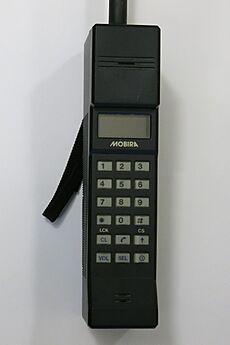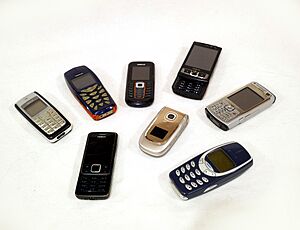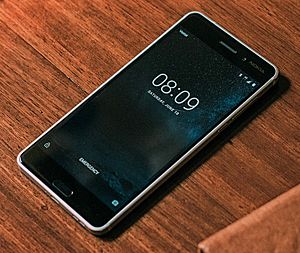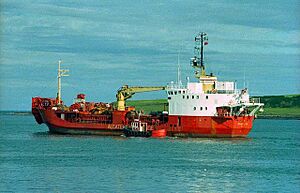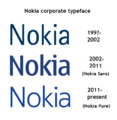Nokia facts for kids

Logo used since 2023
|
|
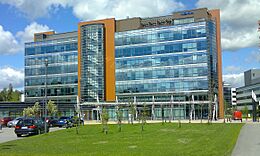
Headquarters in Espoo since September 2019
|
|
|
Native name
|
Nokia Oyj
|
|---|---|
| Public | |
| Traded as |
|
| ISIN | ISIN: [https://isin.toolforge.org/?language=en&isin=FI0009000681 FI0009000681] |
| Industry |
|
| Predecessors |
|
| Founded | 12 May 1865 in Tampere, Grand Duchy of Finland |
| Founders |
|
| Headquarters |
,
Finland
|
|
Area served
|
Worldwide |
|
Key people
|
|
| Products | List of Nokia products |
| Revenue | |
|
Operating income
|
|
| Total assets | |
| Total equity | |
|
Number of employees
|
|
| Divisions |
|
| Subsidiaries |
|
Nokia Corporation is a big Finnish company that works in telecommunications, information technology, and consumer electronics. It started way back in 1865 as a paper mill! Today, Nokia's main office is in Espoo, Finland.
For a long time, Nokia was famous for making mobile phones. From 1998 to 2008, it was the biggest seller of mobile phones and smartphones in the world. Nokia also helped create important mobile phone technologies like GSM and LTE.
After some challenges, Nokia sold its mobile phone business to Microsoft in 2014. Since then, Nokia has focused on making equipment for phone networks and developing new technologies. The Nokia brand returned to mobile phones in 2016 through a company called HMD Global. Nokia is still a major company that licenses its technology to many other phone makers.
Contents
- Nokia's Journey Through Time
- What Nokia Does Today
- Nokia Networks: Building the Future of Communication
- Nokia Technologies: Innovation and Licensing
- Nokia Bell Labs: Groundbreaking Research
- NGP Capital: Investing in New Ideas
- Nuage Networks: Cloud Solutions
- Alcatel Mobile: Another Phone Brand
- HMD Global: The Return of Nokia Phones
- Alcatel Submarine Networks: Undersea Cables
- Nokia's Business Performance
- How Nokia is Managed
- Awards and Recognition
- Nokia's Logos Through Time
- See also
Nokia's Journey Through Time
Nokia has a very long and interesting history, changing what it does many times over 150 years.
Early Days: From Paper to Rubber
Nokia began in 1865 when a mining engineer named Fredrik Idestam built a pulp mill (a factory that makes paper pulp) in Finland. A few years later, he opened a second mill near a town called Nokia. In 1871, Idestam and his friend Leo Mechelin officially named their company Nokia Ab.
Later, Nokia joined with other Finnish companies. One was a rubber company called Finnish Rubber Works, which made things like tires and rubber boots. Another was the Cable Factory, which made electrical cables. These companies eventually merged to form the Nokia Corporation we know today.
Growing into Electronics and Radio
In 1967, the three companies – Nokia, the Cable Factory, and Finnish Rubber Works – officially became one big company: Nokia Corporation. They had four main parts: forestry, cables, rubber, and electronics.
In the 1970s, Nokia started getting into networking and radio. They made military equipment for Finland's defense forces, like special radios and gas masks. Nokia also started making professional mobile radios and telephone switches.
A new CEO, Kari Kairamo, took over in 1977. He helped Nokia grow by buying other companies. Nokia became the third-largest television maker in Europe for a while.
The Rise of Mobile Phones
Nokia's journey into mobile phones started when it bought a company called Mobira in 1979. Mobira made mobile radio telephones. In 1981, Mobira launched the first international cellular network, which allowed people to use their phones in different countries.
In 1982, Nokia launched its first mobile phone, the Mobira Senator. It was a car phone and quite heavy! At first, some people at Nokia thought mobile phones were just fancy gadgets.
After some changes in leadership, Jorma Ollila became CEO in 1992. He decided that Nokia should focus on telecommunications. This was a very smart move, and Nokia grew super fast.
Nokia helped create the GSM mobile standard in the 1980s. The very first GSM call was made in Finland in 1991 using Nokia equipment. In 1992, the Nokia 1011 was released, which was the first widely available GSM mobile phone.
Nokia Becomes a Phone Giant
By October 1998, Nokia became the best-selling mobile phone brand in the world. They sold phones that were popular with young people and fashion-conscious buyers, like the Nokia 5110 and 3210. These phones had cool, colorful, changeable covers.
Nokia also helped create Symbian OS, an operating system for early smartphones. In 2001, they released the Nokia 9210 Communicator and later the Nokia 7650, which was one of the first phones with a camera. Nokia became known for making great camera phones.
The company was also a pioneer in mobile gaming with the super popular Snake game, which came on many Nokia phones. In 2002, Nokia tried to make a gaming device called the N-Gage, but it didn't do as well as they hoped.
By 2008, Nokia's share of the global mobile phone market reached its highest point at 38.6 percent.
Challenges and Changes
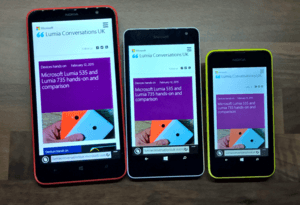
In the late 2000s, Nokia faced tough competition from new smartphones like the iPhone and phones using Android. Nokia's own Symbian operating system started to feel old.
In 2010, Stephen Elop became Nokia's CEO. In 2011, Nokia announced a big partnership with Microsoft. They decided to use Windows Phone 7 as their main operating system for smartphones instead of Symbian. This was a huge change for the company.
However, sales continued to fall, and Nokia faced big financial losses. In September 2013, Nokia announced that it would sell its mobile phone business to Microsoft. The sale was completed in April 2014.
Nokia After the Phone Sale
After selling its phone business, Nokia focused on its network equipment division, which became Nokia Networks. This part of the company makes the technology that powers mobile phone networks around the world.
In 2015, Nokia bought Alcatel-Lucent, another big telecommunications company. This made Nokia an even stronger competitor in the network equipment market. This purchase also brought Bell Labs, a famous research company, into Nokia.
In 2016, the Nokia brand returned to the mobile phone market. A new company called HMD Global, started by former Nokia employees, got the license to make Nokia-branded phones and tablets, including new Android smartphones.
Nokia has also been a leader in developing 5G wireless technology, which is the next generation of super-fast mobile networks.
Recent Developments
In 2020, Pekka Lundmark became Nokia's new CEO. Nokia has continued to make deals to build 5G networks for companies around the world. In a cool development, Nokia even signed a contract with NASA to build a 4G mobile network on the moon!
In February 2023, Nokia changed its logo for the first time in almost 60 years. The new logo was designed to show that Nokia is more than just a mobile phone company now.
What Nokia Does Today
Nokia is a public company listed on stock exchanges in Helsinki and New York. It plays a very important role in Finland's economy and employs many people.
Nokia has two main business groups, plus other smaller companies.
Nokia Networks: Building the Future of Communication

Nokia Networks is the biggest part of Nokia. It makes equipment for wireless and fixed networks, like the towers and systems that allow your mobile phone to connect to the internet and make calls. It's one of the largest telecom equipment makers in the world.
Nokia Networks focuses on technologies like GSM, 3G, LTE, and 5G networks. They help phone companies build and run their networks.
Nokia Technologies: Innovation and Licensing
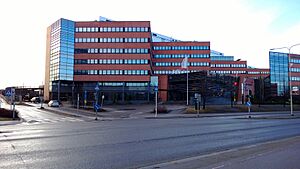
Nokia Technologies is the part of Nokia that develops new products and licenses the Nokia brand to other companies. This means they design cool new tech and let other companies make and sell products using the Nokia name.
In 2014, Nokia Technologies launched its first product, the Nokia N1 tablet computer. In 2015, they introduced a virtual reality camera called OZO, which was designed for professional filmmakers to create amazing 3D videos. Even though the OZO camera is no longer made, Nokia still works on immersive audio technologies.
Nokia Bell Labs: Groundbreaking Research
Nokia Bell Labs is a famous research and development company that became part of Nokia when it bought Alcatel-Lucent. Bell Labs has a long history of inventing important technologies, and they continue to do cutting-edge research for Nokia.
NGP Capital: Investing in New Ideas
NGP Capital is a company that invests in new and growing technology companies, especially those working on the "Internet of things" (IoT) and mobile technology. They help new companies get the money they need to develop their ideas.
Nuage Networks: Cloud Solutions
Nuage Networks provides special software solutions for software-defined networking. This helps companies manage their computer networks and cloud services more easily and automatically.
Alcatel Mobile: Another Phone Brand
Alcatel Mobile is a mobile phone brand that Nokia owns. However, the phones are actually made and sold by a Chinese company called TCL under a special agreement.
HMD Global: The Return of Nokia Phones
HMD Global is the company that makes new Nokia-branded phones and tablets today. It was founded by former Nokia employees. Nokia has invested in HMD Global and helps guide the development of these new devices.
Alcatel Submarine Networks: Undersea Cables
Alcatel Submarine Networks (ASN) is a company that builds and installs undersea cables. These are the super-long cables that run across the bottom of the world's oceans and carry most of the internet's data. ASN became part of Nokia when it bought Alcatel-Lucent.
Nokia's Business Performance
Nokia's financial performance has changed a lot over the years. Here's a quick look at some key numbers:
| Revenue (€ bn) |
Net profit (€ bn) |
Employees | |
|---|---|---|---|
| 2019 | 23.3 | 0.007 | 98,300 |
| 2020 | 21.8 | −2.5 | 92,000 |
| 2021 | 22.2 | 1.6 | 87,900 |
| 2022 | 24.9 | 4.2 | 86,800 |
| 2023 | 22.2 | 0.66 | 86,600 |
| 2024 | 19.2 | 1.2 | 80,300 |
How Nokia is Managed
Nokia is managed by its shareholders, a board of directors, and a leadership team. The company follows Finnish laws and its own rules to make sure everything runs smoothly.
Nokia's Leaders
Here are some of the people who have led Nokia over the years:
| Name | Years |
|---|---|
| Björn Westerlund | 1967–1977 |
| Kari Kairamo | 1977–1988 |
| Simo Vuorilehto | 1988–1992 |
| Jorma Ollila | 1992–2006 |
| Olli-Pekka Kallasvuo | 2006–2010 |
| Stephen Elop | 2010–2014 |
| Rajeev Suri | 2014–2020 |
| Pekka Lundmark | 2020–2025 |
| Justin Hotard | 2025–current |
| Name | Years |
|---|---|
| Lauri J. Kivekäs | 1967–1977 |
| Björn Westerlund | 1977–1979 |
| Mika Tiivola | 1979–1986 |
| Kari Kairamo | 1986–1988 |
| Simo Vuorilehto | 1988–1990 |
| Mika Tiivola | 1990–1992 |
| Casimir Ehrnrooth | 1992–1999 |
| Jorma Ollila | 1999–2012 |
| Risto Siilasmaa | 2012–2020 |
| Sari Baldauf | 2020–current |
Company Culture
Nokia's company culture is called The Nokia Way. It focuses on making quick decisions and being flexible. The official business language at Nokia is English.
Nokia's values include respect, achievement, renewal, and challenge. These values guide how the company operates and how its employees work together.
Nokia's Headquarters
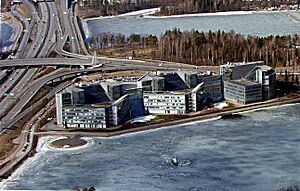
Nokia's main office is in Karaportti, Espoo, Finland. They moved there in 2014 after selling their mobile phone business. Before that, their headquarters was in a special building called Nokia House.
Awards and Recognition
Nokia has received many awards over the years. In 2018, it was recognized for its innovative cable and video products. It was also named one of the world's most ethical companies.
Nokia's Logos Through Time
Nokia has changed its logo several times since it started. Each logo shows a different part of its history and what it focused on at the time.
-
Nokia introduced its "Connecting People" advertising slogan in 1992.
See also
 In Spanish: Nokia para niños
In Spanish: Nokia para niños


